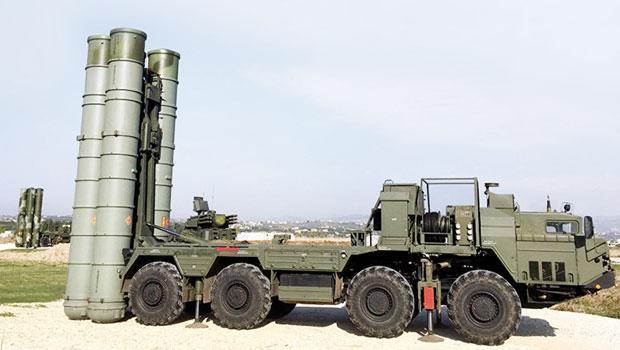Nearly half of Turks favor purchase of S-400 missiles: Survey
ISTANBUL

Nearly half of the Turkish public is in favor of purchasing the S-400 anti-ballistic missiles from Russia despite sanction threats from the United States, according to a poll released on July 4.
One of the most important questions asked in this year’s poll conducted by Kadir Has University since 2015 was “In view of the U.S. and NATO’s objections to the purchase of weapon systems from Russia and U.S.’s threat to implement sanctions against Turkey, should Turkey purchase S400 missiles from Russia?”
Some 44 percent said it should, while 24.9 percent said it should not. However, 31.1 percent said they had no idea.
While supporters of the ruling Justice and Development Party (AKP) topped the list with 49.6 percent in favor of the purchase, 43.7 percent of main opposition Republican People’s Party (CHP) supporters said Turkey should go ahead with the purchase. Some 48.1 percent of high school graduates are in favor of the S-400 purchase and 44.3 percent of university graduates are as well.
One of the key findings of the poll is the public’s perception of what the most important foreign policy issue is. Relations with the U.S. topped the list this year as the most important issue, with nearly half of the respondents saying ties will worsen in the future.
The poll also aimed at measuring the knowledge of respondents about Turkish foreign policy issues. When asked “Did you previously hear about the S-400? If yes, can you explain what the S-400 is?” nearly half the respondents gave the correct answer. Some 19.6 percent said it was a missile, 10 percent said it is a Russian missile and 9.3 percent said it is an air defense system. At least 37.4 percent said they had never heard of it. Similarly nearly half of the respondents gave a correct answer to what the F-35 fighter jet is, but 41.1 percent said they had never heard of it.
The poll shows a stark contrast in the perception on relations with the U.S. and Russia.
A striking 81 percent of the respondents said the U.S. constitutes a threat to Turkey, a jump from 60.2 percent in 2018. Russia ranked 12th among countries seen as threats with 44.2 percent, coming after countries like France, England and Germany.
Asked who they thought Turkey’s friends were, Russia ranked 14th, coming after countries like Iran, Venezuela and Ukraine, while the U.K., U.S. and France were at the bottom of the list, with less than 5 percent of the respondents saying they are friends. Even Greece, drawing 10.5 percent and with which Turkey has had several unsolved problems throughout decades, ranked higher than Germany. Only 9.3 percent believe Germany is a friend of Turkey.
According to the poll, the Turkish public has an overall positive perception on relations with Russia, as 55 percent of the respondents used positive description of the ties with Moscow. Some 26,1 percent of the respondents said there is strategic partnership with Russia, 13.4 percent said there is close cooperation and 16.3 said there is cooperation. According to 24 percent of the respondents, there is neither cooperation nor problems. Some 11.1 percent used negative description, with 4.6 percent saying relations are hostile and 6.5 percent saying there are problems with Moscow.
By contrast, the perception on relations with the U.S. is highly negative, as only 24.1 percent of the respondents used affirmative descriptions. Some 39.4 said the U.S. is not trustable and 13 percent said it is an enemy country. Only 14.5 percent said it is a strategic partner, while 2.2 percent said it is a friendly country and an ally.
The differences on political party basis were slim in terms of viewing the U.S. as not trustable. While around 42 percent of AKP and İYİ (Good) Party said the U.S. is not trustable, these figures were around 39 percent for CHP and National Movement Party (MHP) supporters.
Turks against normalization with Israel
There is a similar consensus among supporters of different political parties on what they think of normalization of relations with Israel. Half of the respondents said they are against it, while 23.2 percent said they are in favor of normalization. Some 51.2 percent of supporters of the CHP ranked first in the list of those against normalization followed by voters of the MHP (51.1), AKP (49.7) and Peoples’ Democratic Party (HDP) 49.5.
While 20.6 percent of the respondents said relations with the U.S. were the most important foreign policy issue, 18.3 said cross-border operations against terrorism were important. Syria also appears to be seen as one of the most important foreign policy issues, as 12 percent sees the war in Syria as an important foreign policy issue, followed by 10.5 percent who believe the presence of the PYD in Syria is as crucial.
Some 39.6 percent said Turkish-U.S. relations will evolve in a negative direction, while only 7.3 percent said they will improve. Some 37 percent said they will not change.
While there is positive perception on relations with Russia, the public seems to be aware of the problems with Russia on issues like Syria’s future, regional energy resources and the fight against terrorism. Half of the respondents said there are differences in opinion between the two or that they are rivals on those issues.
















